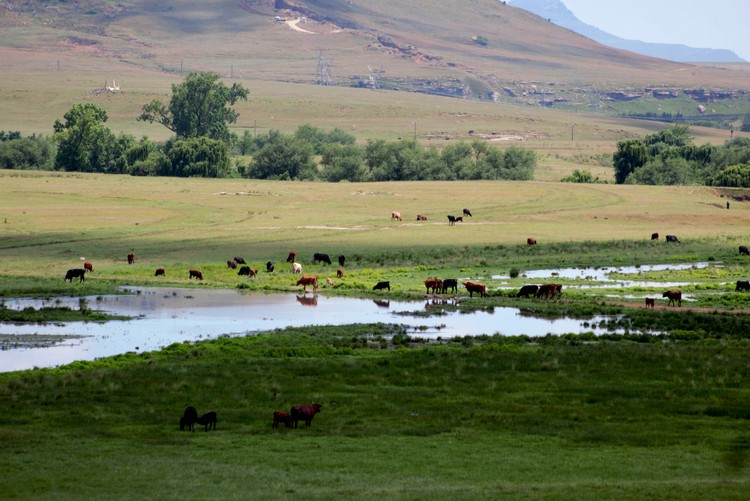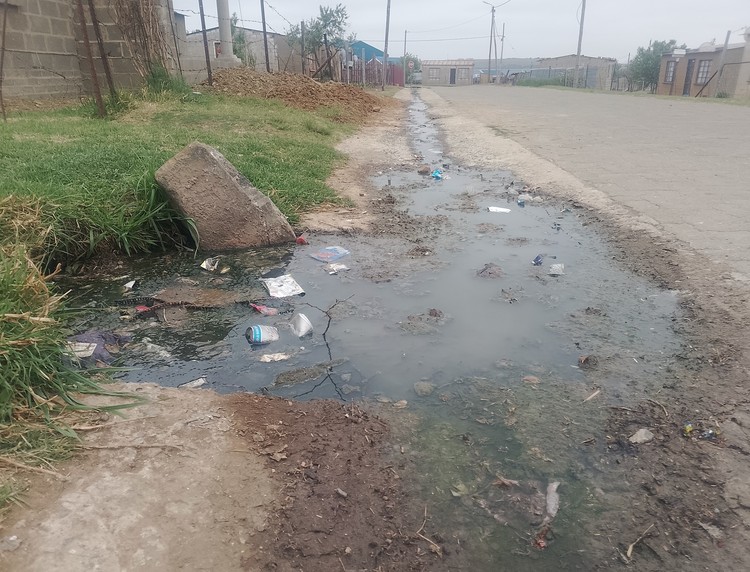Cattle are drinking sewage on this Free State veld
Sewage treatment has broken down in Maluti-a-Phofung municipality
Cows graze around vleis of raw sewage in Phuthaditjhaba. Photos: Tladi Moloi
- All seven of the Maluti-a-Phofung municipality’s wastewater treatment works are in a state of failure, releasing untreated or barely treated sewage into rivers which flow to the Vaal Dam.
- The sewer pipes and pump stations are also broken, resulting in sewage flowing into the veld.
- Cattle farmers, who rely on their small herds for a living, say their cattle are getting sick and dying.
The collapse of the Maluti-a-Phofung municipality’s sewage system is contributing to the pollution of the Vaal Dam catchment, affecting small farmers and causing extensive contamination of the surrounding environment.
None of the municipality’s seven wastewater treatment works (WWTWs) are functional. The up to 31-million litres of sewage that flow into the plants daily is not properly treated, in most cases not treated at all, and is released into rivers that flow to the Vaal Dam. The dam is also receiving untreated sewage from failing sewage treatment plants in Mpumalanga.
Effluent released from wastewater treatment works is supposed to be tested once a month and the results uploaded on the Department of Water and Sanitation (DWS) Integrated Regulatory Information System (IRIS). Effluent that meets the national guidelines is clean enough for intermediate contact activities such as canoeing and fishing, but the Maluti-a-Phofung’s treatment works are failing to such an extent that its results, if tests are conducted at all, have not been supplied since at least 2016.
The DWS’s latest audit of South Africa’s wastewater treatment works — the 2022 Green Drop Report — gave the municipality an overall score of just 18%, with individual treatment plants scoring between 6% and 22%. A score of 90% is considered satisfactory. Scores below 31% indicate a wastewater treatment plant in a “critical state” “requiring urgent intervention”, according to the report.
But due to broken pipes and pump stations, much of the 31 million litres of sewage per day the wastewater treatment works are designed to treat, does not even make it to the treatment works.
In and around Phuthaditjhaba there are permanent vleis of raw sewage from broken and leaking infrastructure.
Eventually flowing into the Wilge River, which flows into the Vaal Dam, the long-standing sewage spills pollute the local environment and affect stock farmers.
Impact on small farmers
Raw sewage is a biohazard containing various species of bacteria and disease-causing pathogens, microplastics, pharmaceuticals which cause antibiotic resistance and endocrine disruption, toxic metals such as lead and harmful industrial per- and polyfluorinated alkyl substances (PFAS).
Blessing Moxe Hlongwana, a zoology master’s student in the University of the Free State’s Qwaqwa Campus, said these contaminants accumulate in water, a process known as bio-accumulation. The contaminants may move across different trophic levels: from plants to animals to people, in a process called bio-magnification. As the cattle drink or graze on water sources or plants irrigated or polluted with contaminants, these accumulate in the animals’ deep tissues.
“Some may die or become sick, depending on the concentrations of the contaminants, while some might not even show symptoms due to low concentrations,” he said.
But when these cattle are slaughtered, the contaminants in them have the potential to impact human health.
In a study on microbial contamination in water, Canadian scientists Tim McAllister and Ed Topp, state that PFAS can have negative health impacts “even at ultra-low concentrations”, and “have been found to bioaccumulate in animals and humans in lung, kidney, liver, brain and bone tissue”. They say PFAS exposure is associated with reproductive and developmental, liver and kidney, and immunological effects, as well as tumors in laboratory animals.
Cow herder Nduko Mkwanazi said the veld is full of sewage spillages.
“Sewage is not good for the animals. They get sick,” said Mkwanazi. “I am trying my best to give cattle [clean] water in the morning, but they drink from the spillages once they feel thirsty.”
He said he tries to stop the cattle from wading through sewage, especially because any scratches or wounds they might have on their legs worsen.
Tshepang Moleleki, who farms a small herd of cattle, said he often has to buy medication for his herd. He blames the contaminated water, but there is no way to prevent them drinking it because the sewage is “all over”. Sewage spills are so pervasive, says Moleleki, that there is no uncontaminated grazing.
Mohlomong Maine, chairperson of the Tshireletsa Tlhao Le Phoofolo anti-stock theft organisation in Qwaqwa, said he has had to give up his small herd. He gave his five cattle to his son-in-law in Welkom, where they could graze on healthy veld. This was after some of his cattle died, he believes from polluted veld and rivers.
He said cattle were a means of income, selling animals for slaughter, particularly for funerals and family gatherings, but he was concerned that people would get sick if they ate the meat from animals that had been drinking contaminated water.
Refurbishment plans
Free State DWS head Tseliso Ntili confirmed that none of the municipality’s seven sewage treatment plans are functioning and the effluent they release flows into the Wilge River and on to the Vaal Dam.
“We recently went to Maluti-A-Phofung and … one of the things we have observed was the pollution which has started to happen, which is going straight to Wilge River, which obviously affects Vaal Dam,” said Ntili.
He said “all seven” of the municipality’s sewage treatment plants were “not working”. “We have to work with them from scratch.” He said operation and maintenance of the plants was a problem, as well as vandalism.
Maluti-a-Phofung Water (MaP Water), the water service provider established by the municipality, has stated that untreated waste has “unfortunately been diverted into the rivers” due to “some wastewater treatment plants malfunctioning”.
In an unattributed statement, MaP Water said ageing infrastructure, underfunding, increased demand, vandalism, and the disposal of foreign objects in the sewer system had all contributed to the problem.
It said it was working on “a comprehensive plan” to refurbish the sewage treatment plants, following intervention by the DWS deputy minister, his department, the Vaal Central Water Board and the municipality.
DWS spokesperson Wisane Mavasa said consultations over the state of sewage treatment works were held with Maluti-a-Phofung and other municipalities in the district on 29 March 2023, where they were trained on how to prepare a corrective action plan. They were supposed to have submitted a revised plan, but Maluti-a-Phofung only submitted its plan almost a year later.
Mavasa said the plan was not accepted for implementation after it had been assessed, and this was communicated to the municipality in August 2024.
Asked what is being done to return the municipality’s sewage treatment works to proper working order, Mavase said as part of the ministerial intervention, all Maluti-a-Phofung’s sewage treatment plants would be refurbished, with the projects to be implemented by Vaal Central Water Board. This was made possible through the Regional Bulk Infrastructure Grant.
She said the planning phase for most projects had been completed, with some already at the pre-implementation phase. “Vaal Central Water anticipates starting with appointment of contractors for some of the projects from April 2025,” she said.
Sewage flows in the streets of Tshiame B under the Maluti-a-Phofung local municipality.
Support independent journalism
Donate using Payfast

Don't miss out on the latest news
We respect your privacy, and promise we won't spam you.
Next: Community health workers must be made permanent, rules labour court
Previous: 400 Eastern Cape families dumped in wetland without services for 13 years
© 2025 GroundUp. This article is licensed under a Creative Commons Attribution-NoDerivatives 4.0 International License.
You may republish this article, so long as you credit the authors and GroundUp, and do not change the text. Please include a link back to the original article.
We put an invisible pixel in the article so that we can count traffic to republishers. All analytics tools are solely on our servers. We do not give our logs to any third party. Logs are deleted after two weeks. We do not use any IP address identifying information except to count regional traffic. We are solely interested in counting hits, not tracking users. If you republish, please do not delete the invisible pixel.


